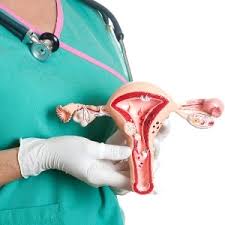Cervical cancer is a form of cancer which occurs in the cervix or the lower part of the uterus in women, which opens up into the vagina. Its different from the other cancers that occur in other parts of the uterus and has a high rate of being cured if detected early.
Causes of Cervical Cancer: Cervical cancer is usually caused when abnormal cells present in the cervix, get out of control. Usually, major cases of cervical cancer are caused by a virus known as the human papillomavirus or HPV. This virus gets transmitted from one person to another by sexual means or sexual contact. Abnormal changes in the cervix cells lead to cervical cancer. Usually, cell changes occur in the transformation zone in the cervix as the cells tend to change constantly, thereby leading to cancer.
Symptoms:
1. Abnormal vaginal bleeding between menstrual phases, after menopause or after having sex.
2. Pain is experienced during sex.
3. Abnormal vaginal discharge is produced.
4. Abnormal changes in the menstrual cycle.
5. Anemia due to abnormal bleeding from the vagina.
6. Recurring pain in the pelvis, back or leg.
7. Several urinary problems due to the blockage of the uterus.
8. Urine or stool leakage into the vagina.
9. Loss of weight.
How it can be diagnosed?
A routine screening test should be undertaken to observe any abnormal cell changes in the cervix and also for the screening for cervical cancer. Taking regular Pap smear test is recommended to detect abnormal cell changes so that cervical cancer can be prevented before hand. Other diagnostic tests include, Colposcopy and cervical biopsy to determine the presence of abnormal cells in the cervix, Endocervical biopsy and Cone biopsy.
Treatment options available:
Cervical cancer can be treated when detected at an early stage. The type of treatment depends on the stage and type of cervical cancer. The most common treatment methods are as follows:
Surgery can be undertaken for removal of the cancer. Several types of surgeries exist and the ideal one depends on the location and severity of the cervical cancer.
Radiation therapy involves the use of high dosage X-rays and implants within the vaginal cavity. This kills the cancer cells and is used in some specific stages of cervical cancer. This therapy is often used alongside surgery.
Chemo-radiation is a combination of radiation therapy and chemotherapy. This procedure can be used at various stages of cervical cancer.
Chemotherapy involves using medicines for killing cancer cells. It is used in advanced stages of cervical cancer.
Pelvic cancer is caused by abnormal cell changes in the pelvis. It is a common kind of cancer and can cause negative effects on the health. Proper diagnosis and treatment are essential for treating pelvic cancer.

Women never have it easy and when it comes to the matters of health and hormones they have to endure the tortures lifelong. Right from puberty to periods to pregnancy to menopause a woman is constantly struggling to attain a balance with her notorious hormones and her life. Of course, these hormones are not to be blamed as they are only functioning a certain way to ensure that a woman’s physiological and psychological health is balanced and stable. But the fallouts like mood swings, fatigue, lethargy is too much to deal with. While we all speak about how the hormones govern every bit of a woman’s life – puberty, pregnancy, menopause – not much is spoken about a particularly important phase of her life again ruled by the hormones – perimenopause.
In fact, Dr Veena aurangabadwala, Gynecologist, Zen Multispeciality Hospital, Chembur, says, ‘Many people think that this phase is one of the most relaxing phases for a woman but in reality, this is the time when many health issues crop up, especially if the woman is ignorant about her health. In fact, a midlife crisis is not a myth but a reality for women facing perimenopause.’
Dr Veena cautions that during this period a lot of health issues and complaints are seen among women.
Health and you
According to Dr Veena, this is also the time when 30-40 per cent of women develop benign conditions such as fibroids in the uterus/breasts, cysts in the breasts causing some or no symptoms. Some of them also develop menstrual irregularities which can be either stress induced or due to hormonal change. Women do experience extremes of mood swings, hot flashes, phases of depression, loosening of the abdominal skin, bloating, vaginal and at times urinary symptoms too. But they may also be a sign of the most dreaded precancerous or cancerous changes in the reproductive organs. It is important to seek medical attention of a specialist, to rule out possible cancerous changes and treat these conditions by medications, or surgically (if required).
What she can do
In the light of increasing sporadic (not inherited) incidence of breast cancers, and the less aggressive cervical cancer, all women above the age of 40 years, must get their Pap smears and Mammography done at regular intervals of 1-3 yrs (based on familial risk factors). All women must know the technique of Self Breast Examination (SBE). A health check-up once in a year or two (including these screening tests) will help us women stay fit and help identify any new medical conditions requiring attention. A healthy Midlife can make a richer and healthier second innings.
One of the common complaints associated with sexual intercourse, is vaginal bleeding. This bleeding can occur during the course of intimacy or after it. Post intercourse bleeding is also termed as post-coitus bleeding. This is known as post costal bleeding. Doctor should be consulted immediately as it may be a sign of hidden cervical cancer.
Reasons behind vaginal bleeding
In most cases, the bleeding is risk free. It could be due to extreme friction, causing damage to superficial blood vessels in the cervix. It is important to use adequate lubrication; otherwise the consequences could be annoyingly painful.
If your period dates are nearby, the source of the blood could be from your uterus.Benign growths, cysts, polyps on the cervix can cause bleeding. They are small fragile growths that rupture easily.There can also be bleeding due to inflammations that occur as a reaction to a condom or a diaphragm.
When can vaginal bleeding be difficult?
Vaginal bleeding after sex can often be a warning sign of ectopic pregnancy. Ectopic pregnancy is when implantation of an embryo takes place outside the uterus, commonly inside the fallopian tubes.
Bleeding every time after intercourse is also a common symptom of endometriosis. It occurs when the inner lining of the uterus, called the endometrial tissue, appears outside it. Endometrial tissue can attach itself to other surrounding organs in the pelvic region, generally, the abdomen, causing searing pain. It is also a major cause of infertility.
Another cause of vaginal bleeding is atrophic vaginitis, a health condition mostly affecting older women, especially those who have reached menopausal age. This is due to the massive decline in the levels of estrogen that causes vaginal dryness and irritation.
Sexually transmitted diseases could be a serious cause of vaginal bleeding. It is generally accompanied by several other symptoms such as vaginal odour, discharge, pelvic pain, inflammations. It should receive immediate medical attention.
Vaginal bleeding could be a sign of cancer. It could be vaginal, ovarian, uterine or cervical cancer. It requires medical attention without any delay.
Most of the time, the reasons for post coitus bleeding is harmless. However, if it persists, you must pay a visit to your gynaecologist as soon as possible and get a thorough evaluation done. This could save the condition from worsening and also diagnose any other underlying medical condition at an early, curable stage.










